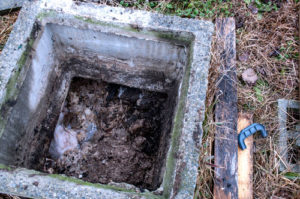A Simple Guide to Understanding When To Avoid Septic Tank Pumping

An older fragile septic tank should be inspected before pumping.
When there is an issue with your septic tank system, many homeowners think they should have the tank pumped to avoid further complications. While pumping is recommended in most situations, there are some conditions where you should avoid pumping a septic tank. If you have questions or concerns, calling Advanced Septic Services of Clermont FL should be your first course of action.
When It’s Best To Avoid Pumping Your Septic Tank
1. When the area around the septic tank has been overtaken by floodwaters, many people think they need to pump the tank to eliminate all that excess water. According to the Clermont FL septic tank professionals, avoid pumping the tank when flood water is still on the ground. All that excess mud and contaminants on the ground could end up inside the tank and lead to a variety of costly complications that will need to be addressed.
2. If you know for sure that your septic tank is fiberglass or plastic, never have the system pumped if there is standing water in the area surrounding the tank. If you do not wait until the floodwaters have subsided, then you risk significant damage to your entire septic system. What happens is as the tank is emptied, the pressure from the water on the ground acts like a vacuum, causing the tank to float to the surface, damaging the tank and the connecting pipes.
3. If you are scheduled to have a septic tank inspection, wait to have the septic tank pumped. If you drain the tank before an inspection, you make it hard for the technician to properly inspect and test the drain-field. Allow the septic tank experts to inspect the entire system first. Then they will be able to tell you if you should continue with the septic tank pumping.
4. If you have an older fragile system that is in questionable condition, do not proceed with the pump out. There are times an older and weaker tank can not handle the pumping without causing damage. The technician will be able to tell you the shape of the system and whether or not you can pump or should consider replacing.
5. If you have a concrete septic tank and think it needs to be pumped and can withstand the flooding in the yard, think again. Ground water over the concrete septic tank can seep into the drain-field and inlet piping once emptied, meaning all sorts of mud and silt are now inside the tank. Once that debris gets inside, you will have to call in the experts to carefully remove them to avoid clogging this delicate system.

